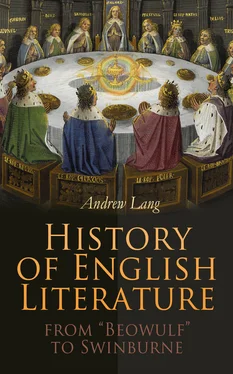The poet begins with an imaginary battle: allied Franks and Huns attack the Emperor Constantine. The motive of Cynewulf is to introduce plenty of fighting: probably he never fought himself, but like other men of peace, he loves to sing of war. His treatment of war is conventional; he introduces the usual cries of wolf, eagle, and raven. Constantine is encouraged by a dream of a bright being who urges him to trust in God; he also sees a vision of the Cross, gay with jewels (as in "The Dream of the Rood") and letters making the words "In this sign conquer". Then the battle is described, with more zest than originality, and the heathen are routed; many are converted. Helena next takes a large force, and sails to Palestine to look for the True Cross. The usual formulæ descriptive of a seafaring are employed.
Helena preaches to the Jews in the mediaeval way, and they, naturally, reply, "We know not, lady, why you are so angry with us". A crafty Jew, Judas, guesses that she has come to demand from them the True Cross, which he is reluctant to give up. Helena threatens to burn the Jews, and does put Judas in a pit, without meat or drink, for seven days. Broken in spirit at last, he says that he will do his best; he prays; a miraculous vapour arises from the spot where, twenty feet underground, three crosses are discovered. Another miracle points out which of the three is the Holy Rood; Judas is baptized, and the shining nails of the Cross are discovered. Then follow the verses in which the poet describes his own old age, and his beholding the true light that lighteneth all men.
Among other poems vaguely assigned, in part, to Cynewulf are Riddles. The Sword describes itself, so do the byrnie, or shirt made of iron rings, the helmet, the shield; and there are many other riddles, some derived from late Latin. The best are really poetical. In addition to the Riddles there are several curious magical songs, or charms, for curing diseases, and removing spells of witchcraft. In these there are remains of the old heathen magical songs.
The "Phœnix," assigned to Cynewulf as usual, is based on a late Latin poem attributed to Lactantius (290-325) and ends as an allegory of Christ. It is interesting to observe in the "Phœnix" a description of an ideal land of peace "where comes not hail or rain or any snow," the picture is borrowed from Homer's lines on Olympus, the home of the gods, and Elysium, the abode reserved for Helen of Troy and Menelaus, in the Odyssey. Anglo-Saxon poetry, without knowing it, came in touch, through Lactantius, with the most beautiful verses in the most ancient poetry of Greece, verses paraphrased in Latin, by Lucretius, and in English by Tennyson, twice ("Lucretius," and the "Morte d'Arthur"), and in "Atalanta in Calydon," by Mr. Swinburne. The golden thread of ancient Greek poetry thus runs through Roman, Anglo-Saxon, and English literature.
1.First published in his time (1655) by Francis Junius (of course not the Junius who has been identified with Francis).
2.find that Mr. W. P. Ker has made the same comparison.
3.Apparently he has confused the Læstrygonians who devoured some of the companions of Odysseus, with the Myrmidonians (Myrmidones) the Greeks who followed Achilles to Troy.
CHAPTER III.
ANGLO-SAXON LEARNING AND PROSE.
Table of Contents
Latin Among the Anglo-Saxons.
Books written on English soil in the Latin language are no part of English literature. It is necessary, however, to notice them, because they testify to the knowledge and taste of the educated; while the ideas expressed in Latin reached the less instructed people through sermons and in conversation, and through the translations into Anglo-Saxon which were directed and in part executed by King Alfred.
Though written by a native of our island we may omit the Latin book of Gildas, of about 516-570, for he was a Briton of the Romanized sort, who fled to Brittany. His book, where it does not contain mere lamentations, gives a kind of history, very vague, of events in the country, and of the sins and crimes of the British princes down to about 550. Such as the information was, Bede, the great early Anglo-Saxon historian, used it, as did the author of "The History of the Britons" attributed to Nennius (say 800), who, like Gildas, mentions the battle of Badon hill, but, unlike Gildas, brings in King Arthur. As we shall see later, Bede does not mention Arthur.
Leaving these vague British writers in Latin, we come to Bede.
When we think of the time in which Bede, the greatest of our early scholars, lived and worked, it seems amazing that he had such a wide knowledge of books and so comparatively clear an idea of the way in which history should be written. Born in 673 (died 735), he was in his thirteenth year when his king, Egfrid of Northumbria, was killed by the Piets (practically Gaelic-speaking Highlanders), in the great battle of Nectan's mere (685), in Angus beyond the Tay, for so far into what is now Scotland had English Northumbria pushed her conquests. Great part of these was lost, and in the eighth century, there came an age of anarchy and civil war, as fierce as the contests of the old times of heathendom. To us the Anglo-Saxons of these ages seem barbarous enough, but Bede speaks of the Piets of Scotland as "barbarians". He constantly deplores the greed and ignorance of the clergy, in terms much like those used by the Protestants before the Reformation. In an ignorant age Bede wrote unceasingly and copiously about such natural science as was within his reach, especially using that popular and fanciful book of Pliny, mere fairy-tales of natural (or unnatural) history. He wrote much and usefully on chronology in relation to history; and on theology, of course, he wrote abundantly. Most important is his "Church History of the Race of Angles," without which we should know little indeed concerning the Anglo-Saxon invasions of Britain, and the development of events both in England and Scotland. His tale of the reception of Christianity by Edwin is very commonly quoted: it is of much literary interest, and proves that the sense of the mystery and melancholy of the world, so often expressed in Anglo-Saxon poetry, weighed heavily on men who were not poets.
A council or Witanagemot was held to consider the Christian doctrines preached by Paulinus. One noble, Coifi, said, in jest or earnest, that the heathen religion was useless, "for no man among your people does more to please our gods than I, but many are more favoured by you and by fortune". Coifi, therefore, voted that Christianity deserved consideration. But another noble, agreeing so far, added, "Human life, oh King,... seems to me to resemble the flight of a sparrow, which flits into your warm hall at a feast in winter weather. The bird flies into the bright hall by one door, and out by another, and after a moment of quiet, slips from the wintry darkness into the wintry darkness again. Such is the life of man, that is for a moment, but what went before, and what comes after, as yet we know not." The practical Coifi then proposed to destroy the old temples of the old gods; rode off, and threw his spear into a shrine.
Coifi's idea was merely to "change the luck," and to enjoy the pleasures of destruction; he was of a common type of reformers; while the other speaker desired intellectual satisfaction, and the understanding of the mystery of existence.
Latin and even Greek learning, we have seen, found footing in southern England with the arrival of Archbishop Theodore and Abbot Hadrian at Canterbury in 669. Latin had never been quite extinct. A non-English writer in Latin, in Scotland, is Adamnan (died 704), author of a Life of the Irish St. Columba, who brought Christianity to the Picts of Scotland, while later from his little holy Isle of Iona missionaries reached Northumbria. Adamnan's book may be read with more pleasure than any other of the time; it is so rich in pictures of Highland life and sport on sea and land, and in tales of magic and the second sight. This was one of the works used by Bede in writing his "History".
Читать дальше












